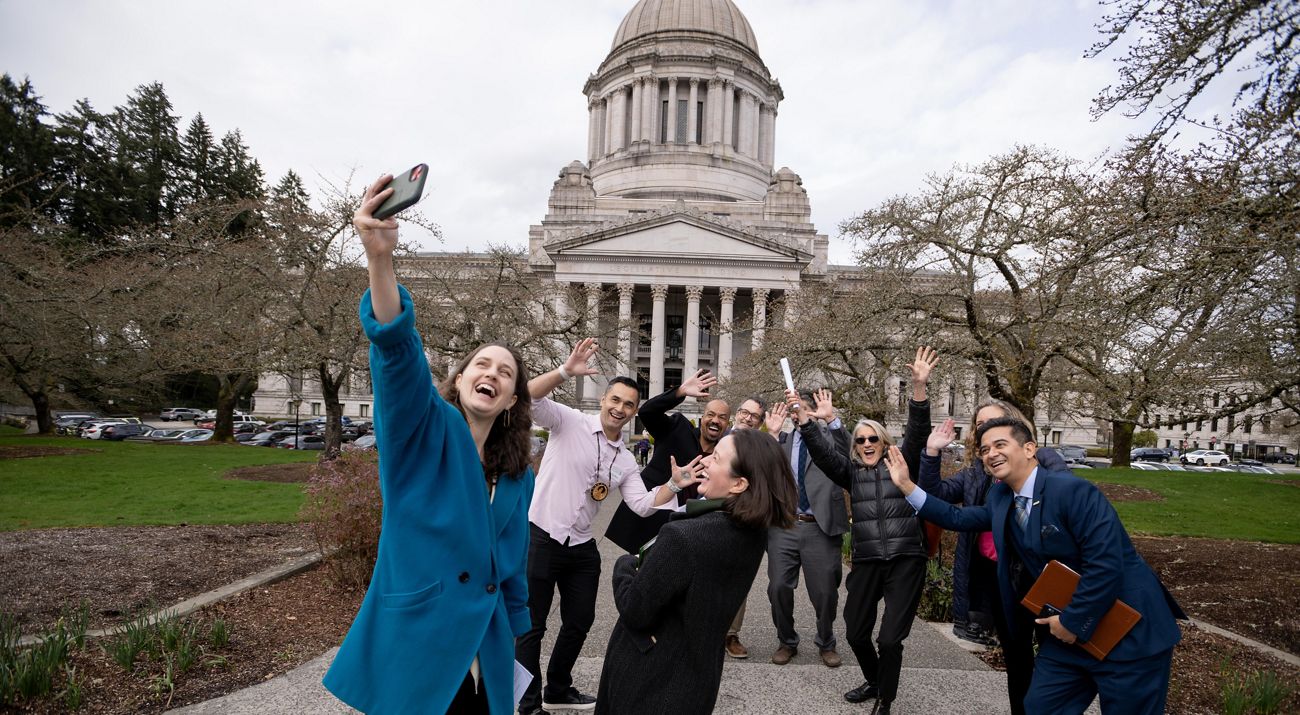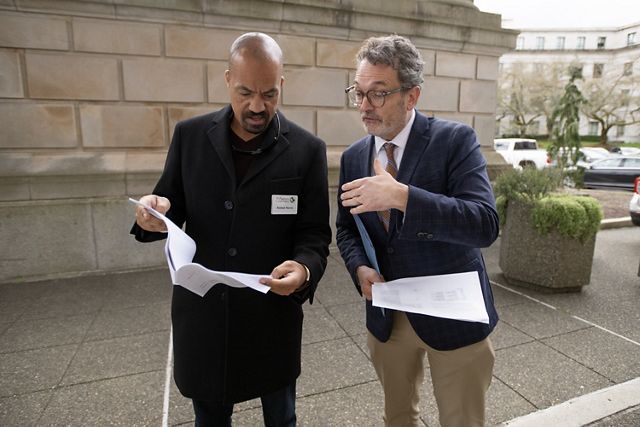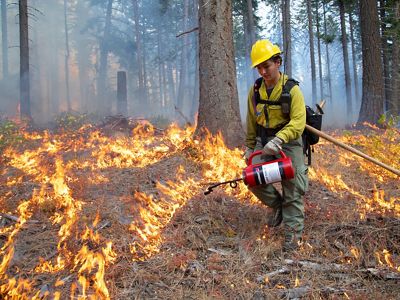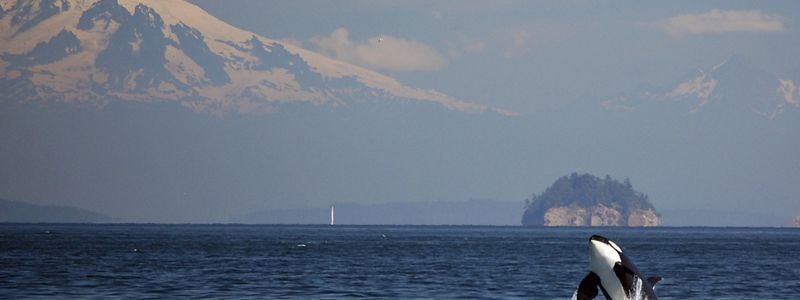Progress Through Uncertainty: Reflections on the 2025 State Legislative Session
In conversation with Skippy Shaw & Sarah Brady

The Washington State Legislature adjourned last month after a session shaped by a shifting landscape and challenging decisions. At The Nature Conservancy (TNC), this session had a lot to teach us about advancing climate and natural resource priorities while navigating deep budget uncertainties.
Skippy Shaw, TNC’s Washington state government relations director, and Sarah Brady, TNC’s policy communications director, reflect on key lessons from this session for our work to protect the lands and waters that sustain us all:
What was our mindset going into this session, and how would you say it went overall?

This was a tough session. Lawmakers faced a $16 billion budget shortfall and difficult decisions touching every corner of state spending. State budgets impact household budgets, and they shape the health and well-being of our communities. We saw the Legislature grapple with how to balance that in ongoing debates about cuts and revenue options. With federal funding uncertainty, we can expect next session and the supplemental budget conversations to be just as challenging. We’re working in a different landscape now.
For The Nature Conservancy, we have a fundamental commitment to the needs of communities in relation to nature—whether that’s wildfire resilience, flood mitigation or access to clean water and healthy lands. That is where we see the heart of our work during challenging times like these.
Considering the difficult budget reality this session, real progress was made on our priorities. One highlight is that billions in funding from the Climate Commitment Act (CCA) was largely preserved for its intended purposes—cutting greenhouse-gas emissions and investing in communities who bear the brunt of climate-change impacts. Washingtonians voted resoundingly to uphold the Climate Commitment Act last fall, and the Legislature is delivering on that mandate by ensuring the integrity of the cap-and-invest spending. We also made progress this session as the Legislature continues to adapt the Climate Commitment Act and Clean Fuels Standard to be durable and responsive to changing conditions while delivering significant emission reductions.
Let’s start by celebrating the wins. What are some of the bright spots coming out of this session?
We’re proud of two major wins:

On the wildfire front, we worked with some amazing legislators and partners to pass House Bill 1563, creating a prescribed fire claims fund for Washington. Liability concerns are a major barrier to getting more of what we call good fire on the ground—a safe and effective tool to restore our forests and prevent extreme wildfires. Also, a tool that has been used by Indigenous Peoples in the Pacific Northwest since time immemorial. This state-backed fund offers private and Indigenous practitioners a safety net in the very rare case of an escapement, boosting confidence for more prescribed fire.
We had strong champions in House Bill 1563’s prime sponsors in the state House and Senate: Rep. Adam Bernbaum and Senator Judy Warnick. The bill passed with nearly unanimous votes, secured $2 million in the state budget for the claims fund, and it was signed into law by Gov. Bob Ferguson in the last week of session.
Another highlight for us on the clean energy front is a $2.5 million state investment to support the Affiliated Tribes of Northwest Indians to launch a Tribal collaborative on clean energy siting. This collaborative will develop a toolkit to guide clean-energy development while respecting Tribal sovereignty—critical for accelerating clean-energy deployment while minimizing conflicts with Tribal rights.
Wildfire remains a top issue for The Nature Conservancy. How did funding for wildfire and forest health do this session?
This is one area where we felt a real setback. In 2021, the Legislature made a long-term funding commitment to address wildfire and forest health with the passage of House Bill 1168. This year’s biennial budget included $60 million, far below the $125 million biennial commitment made in 2021.
We know every dollar invested now helps prevent billion-dollar disasters later. Catastrophic wildfires are a major strain on state budgets, in addition to displacing families, crippling critical infrastructure and degrading air and water quality. Recent federal cuts to wildfire prevention amplify the risks here.
Forest thinning, prescribed burns, workforce training and home-protection efforts help us address those risks—but they all hinge on sustained state funding. We’ll be pushing hard next year for supplemental funding and working with legislators, agency partners and communities to regain momentum.
What lessons did we learn from our clean-energy policy work this session?
Accelerating the deployment of clean energy was a top priority for us. There were several bills this session that addressed clean-energy siting and transmission infrastructure, and we learned a lot about where the conversation stands in Washington.
For example, Senate Bill 5466 aimed to expand the electric transmission grid, a crucial puzzle piece to meeting our climate and clean-energy goals. The bill got a lot of traction initially in session—but didn’t make it across the finish line. The bill’s downfall was a signal for us that we need more robust, coordinated conversations with lawmakers, advocates, communities and Tribal Nations to shape the vision for this type of policy. These are conversations TNC is committed to long term.
We are at an important moment for our state’s energy system. We need a major transformation to meet our climate goals and growing electricity demand. Electricity demand is set to double in the next 20 years—the equivalent of adding seven Seattle-sized cities to the state’s grid. Decarbonizing our energy sources to meet state climate goals requires a scaled-up buildout of more solar and wind generation along with energy storage and transmission lines. According to TNC’s own science, we need to grow transmission capacity by 45-65%. The state has fallen behind in setting the energy policy needed, and we have a lot of work ahead of us here.
Looking ahead, how is TNC approaching the changing landscape?
The Nature Conservancy remains committed to nature as part of the solution to our climate crisis and the critical infrastructure needs of our state. Nature is our common ground. We are stepping into this moment more dedicated than ever to deep partnerships with communities, lawmakers, Tribal Nations and advocates—across the state and across the aisle. We will continue using science and leading with our values.
Stay in the Loop
Get conservation stories, news and local opportunities from where you live.





